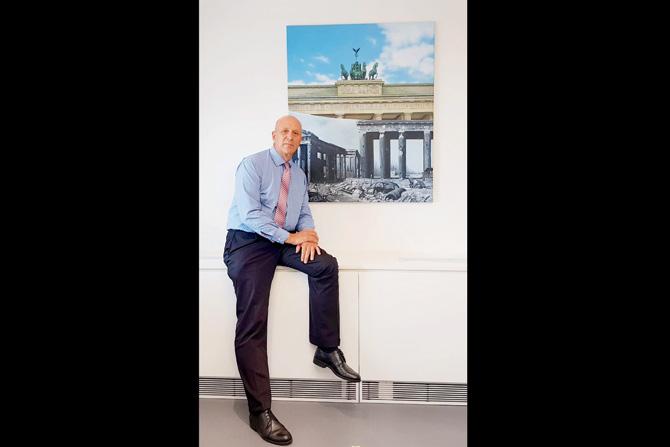With this October 3 marking three decades of the unification of East and West Germany, expats living in Mumbai city recall their stories of the rise and fall of the Berlin Wall.

Suzanne Bernett. Pic/Satej Shinde
On November 9, 1989, Jurgen Morhard was serving in the foreign ministry in Bonn, the then capital of West Germany. "I remember this day as if it were just yesterday; my wife and I were hosting a farewell reception for friends and colleagues prior to our imminent departure to Tokyo. The harbinger of the good news of the opening of the Berlin Wall was a cheery colleague from the German Parliament," Morhard, now the Consul General of Germany in Mumbai, tells us. The East Germans, he adds, had begun to cross over into West Germany. "Our party got busted, but of course, for a very special and joyful moment. Hastily, we all tried to find a radio or a television set on the premises, in order to verify the historic moment."
Unlike Morhard, Suzanne Bernert experienced the immediate effect of the collapse first-hand. "I was a teenager then, and we were driving on the highway to visit my grandmother on her birthday. As my grandfather, a customs officer, was posted at the border of the wall, we were headed in that direction. This was when we saw a sea of Trabant—the iconic East German car—entering our side of the country," the West German-born actress recalls. "We turned on the radio and learned that the wall had come down. Before we knew it, all of us were crying out of happiness. Finally, families and lovers that were ripped apart 40 years ago were going to reunite," Bernert, who played Sonia Gandhi in The Accidental Prime Minister, adds.
This November marks the 30th anniversary of the fall of the Berlin Wall—the 12-foot-high and more than 100-mile-long wall that literally and figuratively divided the democratic West from the communist East. Constructed in 1961, the wall was the Cold War's most tangible symbol of communism and demarcation of the Iron Curtain. A year after the wall was destroyed, on October 3, 1990, the two former countries (the German Democratic Republic and the Federal Republic of Germany) merged to become one unified Germany. Morhard was 33 years old then. "The legal, formal process of unification on October 3, 1990, was an important milestone not only for Germany, but also European and global history. For my generation, the unexpected and the unthinkable had happened. However, it was not an easy political process to achieve; in order to be realised, the re-unification also needed the consent and support from the international community. I think back to this moment and am filled with gratitude to all the statesmen and countries that made this happen. India, too, showed great sympathy and support," he shares.
 Michaela Talwar, co-founder Harkat Studios
Michaela Talwar, co-founder Harkat Studios
As Morhard soon moved to take on his new role in Japan, he had to witness the unfolding of the new course of history from abroad. "In a way, my wife and I regret not being home at the time and that we were only distant observers. However, we had to learn to represent, in many senses, a different Germany in Japan. And of course, we had to assist in the closing down of the former East-German Embassy there," he informs.
Co-founder of Harkat Studios in Mumbai, Michaela Talwar was only a year old then. "My mother had never visited the East and my dad only went once as a teenager there. There were strict border controls, so he was afraid that if he'd say anything wrong, they would just put him in jail. So, in some sense, people in the West knew about the arbitrariness of the Eastern government, but they never experienced it in real life. Yet, they didn't know the world without a divided Germany, so much that they didn't believe that the country could ever be unified. Until it happened," recalls Talwar, who hails from Ulm—a small town in the south of West Germany.
Three decades later, a lot has changed, and all the three German expats unanimously say the re-unification was the most logical decision. "We are mature enough now to ensure that the dark happenings of the past never repeat themselves; we are responsible enough to pass on our learnings to the next generations and make them conscious of their country's history and to weigh their thoughts and actions; we are optimistic that we are headed towards a brighter tomorrow which is not about building walls, but breaking barriers and building bridges," Morhard says.
Talwar is glad she never had to face dictatorship. Now 31 years old she says, "For me, the thought of living next to a dictatorship is gruesome! The fact that there would be a country in the middle of Europe without free speech, is terrifying. I'm just glad I never had to experience it and that I can happily make friends and walk around wherever I want to without being spied on, or machine guns and the very real fear of death."

Consul General of Germany in Mumbai, Jurgen Morhard, against the poster of the Berlin Wall
When we speak to Bernert over the phone about her plans on celebrating the 30th anniversary of re-unification, she says she will be heading to the German Consulate in Mumbai office's celebrations to be held at Mahalaxmi Racecourse starting October 10 onwards. "It is okay if I am not in Germany to celebrate this. But I have my fellow German friends here in Mumbai to rejoice the re-unification," Bernert says. To this, Morhard adds, "Since we are not in Germany, we are bringing Germany to Mumbai. We have something very special planned—we will be erecting a symbolic representation of the Berlin wall at the Racecourse on October 12 and 13. Everybody is invited to come and paint a part of it and leave their mark of freedom and expression."
While Talwar, too, will be participating in the celebrations next week, she feels a lot still needs to be changed. "We still divide Germany into East and West, and new and old states. I never understood this narrative, which is so common in TV reportage and political discourse. Just the mere use of this kind of language divides the country. In East, there are still places where people don't have internet access or proper mobile network. So an invisible wall still exists...," she concludes.
Catch up on all the latest Mumbai news, crime news, current affairs, and also a complete guide on Mumbai from food to things to do and events across the city here. Also download the new mid-day Android and iOS apps to get latest updates
 Subscribe today by clicking the link and stay updated with the latest news!" Click here!
Subscribe today by clicking the link and stay updated with the latest news!" Click here!







